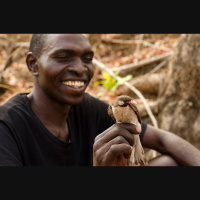Synopsis
Leading science journalists provide a daily minute commentary on some of the most interesting developments in the world of science. For a full-length, weekly podcast you can subscribe to Science Talk: The Podcast of Scientific American . To view all of our archived podcasts please go to www.scientificamerican.com/podcast
Episodes
-
Oldest Known Indigo Dye Found in Peru
14/09/2016 Duration: 02minFabric dyed with indigo just found in Peru is some 1,600 years older than indigo-dyed fabrics that have been found in the Middle East.
-
Road Noise Makes Birds' Lives Tougher
13/09/2016 Duration: 02minBy playing road noise where there was no road, researchers were able to gauge the effect of the noise on bird behavior without having to deal with the effect of the road itself.
-
World Wilderness Down 10 Percent in 20 Years
12/09/2016 Duration: 01minSouth America and central Africa lost the most wilderness in a decline since the 1990s that saw the planet's wild areas down by a tenth
-
Photonic Chip Could Strengthen Smartphone Encryption
08/09/2016 Duration: 01minThe chip uses pulses of laser light to generate truly random numbers, the basis of encryption. Christopher Intagliata reports.
-
Protein Test Could Complement Crime Scene DNA Analysis
07/09/2016 Duration: 01minResearchers determined that the variation of a couple hundred proteins in a person's hair could be enough to single her out from one million individuals. Christopher Intagliata reports.
-
Shark Fins Contain Toxic "One–Two Punch"
02/09/2016 Duration: 02minSharks can accumulate both methylmercury and a toxin called BMAA, which can have synergistic effects on human consumers. Christopher Intagliata reports.
-
Teen Pregnancy Prevention Program Actually Promotes It
31/08/2016 Duration: 02minTeenage girls who cared for infant dolls, an intervention meant to prevent pregnancy, actually had a higher risk of getting pregnant by age 20. Christopher Intagliata reports.
-
Color-Changing Skin Aids Climate Control and Communication
29/08/2016 Duration: 03minBearded dragons modify their colors for camouflage or to maintain body temperature, or to communicate with other dragons. Jason G. Goldman reports. Learn more about your ad choices. Visit megaphone.fm/adchoices
-
Waste Amphetamines Alter Underwater Ecosystems
25/08/2016 Duration: 01minUsing an artificial stream system, researchers found that amphetamine residues altered insect and microbial life in aquatic ecosystems. Christopher Intagliata reports.
-
A Green Solution to Improve Indoor Air Quality
24/08/2016 Duration: 02minIn 12 hours Dracaena plants removed nearly all the acetone from an airtight chamber, suggesting they might be put to use as air filters in nail salons. Christopher Intagliata reports.
-
Humans Are Superpredators in the Landscape of Fear
23/08/2016 Duration: 04minBadgers were far more frightened by the sounds of humans than by their traditional predators, such as bears or wolves. Learn more about your ad choices. Visit megaphone.fm/adchoices
-
Voters Are Seldom Swayed by Local Campaign Stops
19/08/2016 Duration: 02minA survey during the 2012 election found that bus tours and visits to greasy spoons didn't do much to change voter opinions. Christopher Intagliata reports.
-
Ancient Mexican Metropolis Engaged in Hare-Raising Activity
18/08/2016 Duration: 02minUpending the belief that residents of ancient Central America did not practice animal husbandry, new evidence shows that people in Teotihuacán raised and bred rabbits and hares.
-
Model Black Hole Re-Creates Stephen Hawking Prediction
17/08/2016 Duration: 02minA black hole analogue, which traps sound instead of light, generates "Hawking radiation," a key prediction by the theoretical physicist. Christopher Intagliata reports.
-
Pigeon Pb Proxies Could Cut Kids' Blood Tests
15/08/2016 Duration: 02minIn neighborhoods where kids have an increased chance of exposure to toxic lead, pigeons also have higher blood lead levels—making the birds potential proxies for risk assessment.
-
Remote Door Controls Are Car Security Flaw
12/08/2016 Duration: 03minResearchers found that a bad actor could cheaply and easily clone a remote keyless entry system to gain entry. Christopher Intagliata reports. Learn more about your ad choices. Visit megaphone.fm/adchoices
-
This Shark Is the Vertebrate Methuselah
11/08/2016 Duration: 02minIndividual Greenland sharks appear to live perhaps a century longer than any other vertebrate, and might have life spans approaching 500 years.
-
Humans and Birds Cooperate to Share Beehive Bounty
08/08/2016 Duration: 03minThe Yao people of Mozambique vocally signal honeyguide birds to show them the location of hives, which the people harvest and share with the birds. Learn more about your ad choices. Visit megaphone.fm/adchoices
-
Pesticides Act as Honeybee Contraceptives
04/08/2016 Duration: 03minEnvironmental concentrations of certain insecticides slashed honeybee drones' living sperm counts. Christopher Intagliata reports. Learn more about your ad choices. Visit megaphone.fm/adchoices
-
Cut Road Deaths with Mountain Lions
01/08/2016 Duration: 02minReintroducing mountain lions to the eastern U.S. could save human lives and reduce injuries by lowering deer populations and preventing car–deer collisions.





























